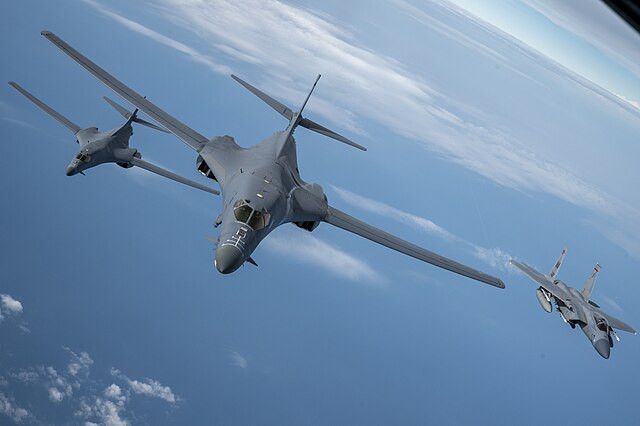The United States deployed two B-1B bombers to the Korean Peninsula on Thursday for a joint military exercise with South Korea, marking the first aerial drill between the two allies since President Donald Trump's return to the White House. The move, which comes amid heightened tensions with North Korea, underscores Washington's commitment to deterring Pyongyang's nuclear ambitions.
The U.S. bombers, which were stationed on Guam, participated in the drill alongside American and South Korean fighter jets in South Korean airspace. The exercise was designed to enhance the allies' ability to carry out coordinated airstrikes while displaying the U.S. military's extended deterrence capabilities against North Korean threats, according to Seoul's Defense Ministry.
Lieutenant General David Iverson, commander of the U.S. Seventh Air Force, emphasized the importance of such joint drills in maintaining operational readiness. "Advanced training like today's event ensures we're able to maintain the high levels of readiness necessary for our combined defense posture," Iverson said in a press release. "Each time our aircrew plan, execute and debrief together, we build proficiency in our tactics, techniques and procedures to defend the Alliance, if required."
The drill featured U.S. Air Force F-16s and stealth F-35Bs, along with South Korean F-15K and F-35A fighter jets. The centerpiece of the exercise, the B-1B Lancer, is a supersonic heavy bomber capable of carrying up to 75,000 pounds of conventional weapons. Although it no longer carries nuclear payloads, the aircraft remains a critical component of U.S. strategic deterrence.
South Korea's Defense Ministry stated that the training aimed to "bolster interoperability of South Korea-U.S. combined forces" and "display the U.S. extended deterrence capabilities against North Korea's nuclear and missile threats."
The exercise comes as tensions with North Korea reach their highest levels in years. Pyongyang has dismissed international calls for denuclearization, vowing instead to expand its nuclear arsenal. On Tuesday, North Korea condemned Washington, Seoul, and Tokyo for what it called an "absurd" objective of forcing its denuclearization. The regime has aligned itself more closely with Moscow, supporting Russian President Vladimir Putin's war in Ukraine while resisting diplomatic overtures from the U.S. and its regional allies.
The Biden administration had pursued a strategy of sanctions and diplomatic pressure to curtail North Korea's weapons programs, but Trump has adopted a more aggressive stance, signaling a readiness to use military force if necessary. The White House reiterated last month that the "complete denuclearization" of North Korea remains a priority, with Trump vowing to pursue this goal through a "mix of toughness and diplomacy."
The U.S. and South Korea have steadily expanded their joint military activities, including trilateral exercises with Japan. On January 15, the three nations conducted a separate drill in airspace between South Korea and Japan, involving two B-1B bombers and multiple fighter jets.
Kim Jong Un's regime has long criticized U.S.-South Korea military drills, viewing them as rehearsals for invasion. In response to past exercises, North Korea has conducted missile tests, including those of intercontinental ballistic missiles capable of reaching the U.S. mainland.






